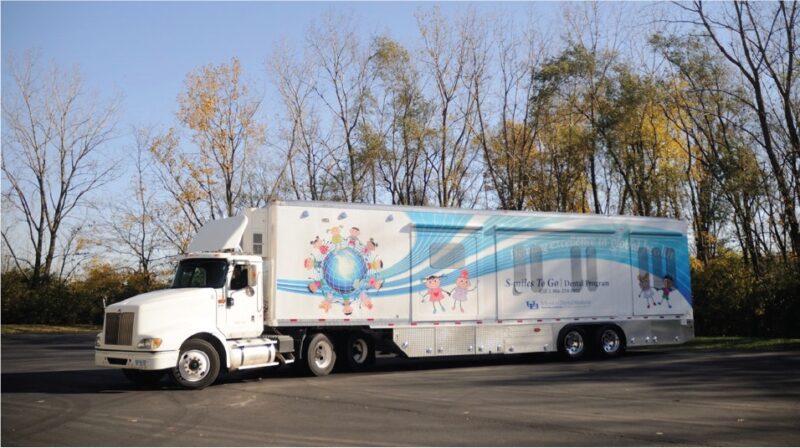Submitted Photo by Jason Chwirut
Pictured is the UB Mobile Dental Unit that serves children in Chautauqua, Cattaraugus and Allegany counties. UB has another dental unit that it uses in other Western New York counties.
According to county Public Health Director Lacey Wilson, the UB Mobile Dental Unit is currently funded through the Mother Cabrini Health Foundation. That foundation has let UB leaders know that they plan on ending their funding of the program soon, since their funding is more for start-up programs.
Wilson said she and other health leaders have spoken with state Sen. George Borrello and County Executive PJ Wendel to find a new source.
According to Wilson, the dental unit is mainly used in Chautauqua County during the school year, weather permitting. They visit a variety of school districts in the county to provide dental service to children who are unable to get care, either because of insurance or distance to dental providers. “Within Chautauqua County, we average about 1,200 students a year,” she said.
With school starting next month, Wilson said the mobile dental service will continue. “There will not be an interruption of services,” she insisted.

The UB Mobile Dental Unit is a fully functioning dentist office that is transported around Western New York.
According to Marcelo W. B. Araujo, Dean of UB’s School of Dental Medicine, the Mother Cabrini Foundation’s funding will end in December. However, he is confident that a new funding source will emerge. “I’ve had a very good meeting with county and state officials, including the state senator representing the region, and we will see what we can do. I feel very optimistic that we will have something,” he said.
Borrello agreed with both the need for the mobile dental unit and expressed his commitment to seek funding. “One of the greatest needs in our rural areas is dental care. When money is tight or transportation or other issues are obstacles, vulnerable people go without care and it can end up impacting their overall health. The UB dental vans provide an invaluable service by bringing dental care right into our communities. County Executive PJ Wendel and I met with UB officials to discuss their program and funding needs. We provided feedback and ideas and will remain engaged with them to help in any way possible,” he said.
Wendel, too, expressed his support for the program. “As county executive, I am proud to support the continued efforts of the University at Buffalo Dental Van Program in Chautauqua County. Access to quality dental care is essential to overall health, and this program has been a vital resource for our community, particularly for those who may not otherwise have access to necessary dental services.
“As the current grant funding for this program nears its end, we recognize the critical importance of ensuring that these services continue uninterrupted. Together with the Chautauqua County Health Department, Board of Health, Senator George Borrello, and the UB Dean of the Dental School, we are actively seeking supportive solutions to secure the future of the UB Dental Van in our county,” he said.
Araujo said even though they have been using the Mother Cabrini Health Foundation recently, there have been other foundations that have funded the mobile dental unit since it began in 1997.
The mobile dental unit has actually changed over the years. It’s often called the “dental van,” but that’s not quite accurate.
According to Ed Morrison, Assistant Dean and Chief Marketing Officer with the University at Buffalo School of Dental Medicine, the first mobile unit used to be similar to a motorhome recreational vehicle. Now it’s a large trailer that needs to be towed to various schools.
The trailer has been used in Chautauqua County since around 2012.
The mobile unit that serves Chautauqua County is also used in Cattaraugus and Allegany counties. Patients are children, but there are no restrictions regarding family income level.
In the three counties, they have around 3,500 visits annually. “Since the van first began, we’ve seen over 80,000 patient visits,” Morrison said.
Araujo noted that they have another dental unit that serves other Western New York counties, including Erie, Niagara, and many more.
Araujo noted the UB mobile dental clinic program has a two-fold purpose. One of the purposes is to serve children who do not see a dentist on a regular basis. The other purpose is to give dental students an opportunity to work, under the supervision of UB faculty.
According to UB’s website, the mobile dental units “increase access to critical oral health care services for children in rural communities, parents and children living on Buffalo’s East Side, low-income older adults, homeless individuals and people with disabilities.
“Services include exams, cleanings, fillings, sealants, fluoride treatments and extractions. The vans contain several dental chairs, a panoramic X-ray machine, sanitization center, a patient waiting area, and a powered chair lift for patients with disabilities. The vans are staffed by pediatric and general dentists from the UB School of Dental Medicine, as well as a dental hygienist and a dental assistant.
“Through the program, we’re enhancing access to quality oral health care to vulnerable populations and providing our students with firsthand experience treating individuals from low-income backgrounds, those with special needs, and pediatric patients,” the website states.
Wendel said long term, he hopes to see the mobile dental unit have an even greater impact in Chautauqua County. “Our commitment is not only to maintain the program but also to take this opportunity to enhance it. We are working closely with our partners to improve the planning and efficiency of the program, ensuring that it remains a sustainable and valuable service for our residents. Oral health is a crucial component of overall wellness, and by working together, we can ensure that all residents of Chautauqua County have access to the dental care they need. I am confident that through our collaborative efforts, we will continue to make significant strides in promoting and preserving the oral health of our community,” he said.
